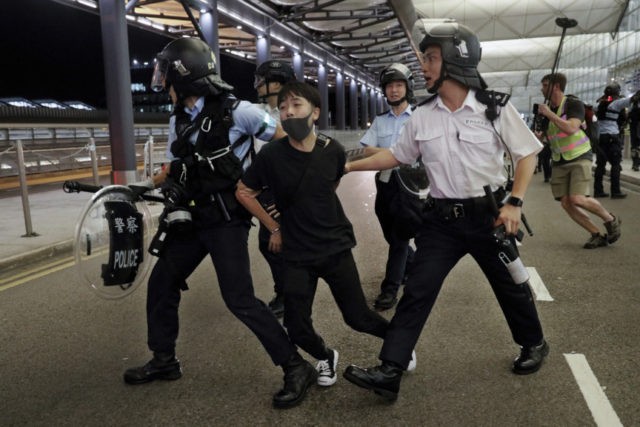Attorneys for some of the dozens of Hong Kong residents arrested for participating in pro-democracy protests in the last three months said on Wednesday that police officers have abused their clients, forcing them to drink what they believe was toilet water.
Protests have continued this week after thousands shut down Hong Kong International Airport on Monday and Tuesday in a bid to get the attention of the Hong Kong government. Protesters have issued five demands to the government, among them freedom for imprisoned peaceful dissidents. Protesters left the airport in the early morning hours of Wednesday after police raided it, seeking to extract two men that protesters had tied up, suspecting them to be Chinese communist agents. One of the men was confirmed to be a propagandist for the Global Times, a communist media outlet.
The Hong Kong protest movement is largely leaderless, and intentionally so, instead focusing on the ideals of individual freedom that protesters are defending. To the extent that the movement has leaders, however, they are veterans of the 2014 “Umbrella Revolution” that Beijing suppressed, some of whom remain imprisoned for refusing to respect the power of an autocratic state governed from over a thousand miles away.
The accusations raised by attorneys for the recently detained protesters raises questions about the treatment that activists like Chan Kin-Man, Edward Leung, and Benny Tai in prison. Tai was released on Thursday on bail, a sign the Chinese regime is concerned about pressure from abroad about human rights abuses against protesters.
The Hong Kong Free Press (HKFP) reported on Thursday that two jailed protesters, who wished to remain anonymous, sought to denounce police for abuses against them. Activist Andy Chan, who spoke on their behalf, said that the protesters were accusing police of offering the men undrinkable toilet water while detained. Hong Kong’s toilets use salt water, leader the protesters to believe police were making them drink “unlimited” toilet water as an insult.
Multiple protesters, the HKFP noted, have also complained that police have not allowed them to retain a lawyer or speak to one if they already had one, including a protester who appeared at the same press conference masked and refused to give her identity.
Hundreds of protesters are believed to have been at least detained, if not charged with a crime, since the protest movement took off in early June. The police have not made arrest numbers for the past three months total available, but have offered numbers following some of the biggest events: 148 people arrested during the protests on the weekend of August 3, for example, during which protesters in the North Point neighborhood of Hong Kong city faced an armed mob of pro-China thugs beating them with sticks and a man driving his car into a protest area. In late July, police charged 44 protesters with rioting for participating in the peaceful protests, compared to 12 charged with battery following a similar mob attack on protesters in Yuen Long, a suburb of Hong Kong.
This past weekend, arrests became more violent as police disguised themselves as protesters before beginning to beat and tie up people participating in protests. A video circulating on social media showed a person wearing a black shirt and hard hat, the typical uniform of the protesters, squeezing an injured protester into a pool of his own blood and insisting to him, “I’m on your side,” as the man pleaded with the police not to hurt him anymore.
Among those arrested for participating in protests are two foreign men, one of whom insisted he was not a protester. The governments of the Philippines and South Korea confirmed that they were aware two of their citizens were in Hong Kong police custody. The Filipino man contends he should not be charged for illegal assembly because he was not participating in protests.
Should evidence surface that the treatment Hong Kong protesters are facing extends to foreigners, the Chinese communist regime, which oversees the Hong Kong government, would have to answer questions from foreign states about human rights violations in subduing the pro-democracy movement.
The revelations Wednesday also lead to questions about the treatment of protesters serving prison time for organizing anti-China events. Among them is Edward Leung, a former student serving a six-year prison sentence for “rioting” against the Chinese regime in 2016. Leung is credited with coining the slogan of the protests, “Reclaim Hong Kong, Revolution of Our Times,” while advocating for independence from communist China. In July, Leung issued a letter citing the Bible and urging protesters to abandon hatred.
“We hope society takes a lenient view of the ‘rioters’, in the ‘riots’ categorised by the government, and listens to their unheard calls,” he said. “I think we should also be mindful of our own words and actions – whether they would get us closer to our goals, or further?”
Another activist leader, Benny Tai, sentenced to 16 months in prison beginning in April, also continued to encourage protests from within prison in regular letters. The legal scholar’s treatment in prison became the subject of controversy last week as police forced him into solitary confinement for refusing to engage in prison labor as a way to participate in the city-wide general strike against the government on August 5. Fearing backlash, Hong Kong authorities freed Tai on Thursday while his case awaited appeal. If his appeal is denied, however, he will return to police custody.
“I am very proud that I can stand with you all together at this very moment. So many people love Hong Kong so much. But, the road ahead is very unclear and very tough,” Tai told reporters after his release. “But I am still confident that Hong Kong’s future is bright. The golden era of our city is yet to come. And I believe that time is not too far away.”

COMMENTS
Please let us know if you're having issues with commenting.